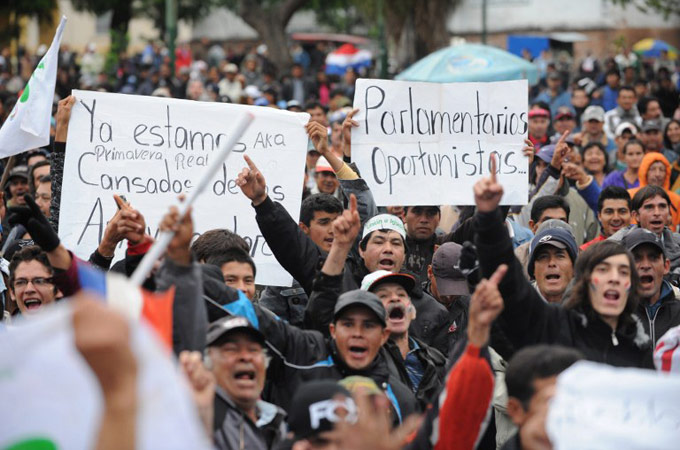 AP is reporting: “Ousted Paraguayan President Fernando Lugo fought back Sunday against the politicians who engineered his dismissal, setting up an alternative government and pledging to upstage Paraguay’s new leaders at an upcoming regional summit.”
AP is reporting: “Ousted Paraguayan President Fernando Lugo fought back Sunday against the politicians who engineered his dismissal, setting up an alternative government and pledging to upstage Paraguay’s new leaders at an upcoming regional summit.”
KREGG HETHERINGTON, krether at gmail.com
Professor at Dalhousie University in Canada and author of Guerrilla Auditors: The Politics of Transparency in Neoliberal Paraguay, Hetherington said today “The Paraguay government of President Fernando Lugo was in the forth year of a five-year mandate. It’s been in power with a strange coalition of progressives, other organizations which have never had political clout, and the Liberal Party, which has been out of power since the 1940s.
“The Colorado Party ruled Paraguay for over 60 years, much of it under military dictatorship until Lugo came to power in 2008. Since then, the Liberal Party has clearly been chomping at the bit to oust Lugo so that it could control the huge patronage apparatus in the country. Since the election was coming up, most people thought that wouldn’t happen now.
“Lugo, who many poor and disenfranchised people had high hopes in, failed to take on the critical issue of land, which is largely divided by local wealthy farmers and Brazilian capital, which is heavily invested in industrial soybean farming. Specifically, what’s happened over the decades with the Colorado Party is that the land reform agency, which is supposed to make things more egalitarian, was actually used in many instances to hand out land grants to wealthy people. This is called ‘ill-gotten land.’ Lugo did nothing on this and so campesinos grew disillusioned with the government and became more militant. They began squatting on land controlled by wealthy landowners that was apparently ‘ill-gotten’ to embarrass the government into doing something.
“On June 15, there was a massacre at one of these invasions, or squats, involving land for a wealthy senator. Several peasants were killed and several policemen where killed. This level of violence is very unusual for Paraguay.
“The ‘impeachment’ proceedings lead Lugo to resign initially, he says now, to avoid further violence. He has since rescinded his resignation. The massacre was apparently seen as a chance by the Liberal Party, whose leader Federico Franco held the vice presidency, to take power, and they joined with the Colorado Party in the impeachment vote. The Liberal Party has already started filling the patronage system with their people, something they have been waiting 60 years to do. Though peasants and progressives have been disillusioned, they have massively supported Lugo since the ouster, given that what awaits is much worse for their interests.”
MARCO CASTILLO FLORENCIO, cfmarco at gmail.com
Marco Castillo Florencio, a sociologist in Paraguay, said today: “At this moment president Lugo has called for pacific resistance with a group of his ministers. There are peaceful demonstrations at the public TV station (this channel was inaugurated during Lugo’s government). The TV station … has become the gathering point of demonstrators that denounced the impeachment as a coup d’état.”
JAVIERA RULLI, javierarulli at yahoo.com
Rulli is an Argentinian researcher who has written extensively on Paraguay. She just co-wrote the piece: “A Tragic Week in Paraguay.”
GREG GRANDIN, grandin at nyu.edu
Grandin is the author of Empire’s Workshop: Latin America, the United States, and the Rise of the New Imperialism and other books on Latin America. He said today: “Lugo has called it a parliamentary coup, and all the Latin American leaders have called it a travesty … a legalistic nonsense. It was a complete farce when it comes to due process. He was given 24 hours to compile his case and two hours to present it. He has the dignity of not participating in it, he didn’t show up. But they ousted him using very legalistic means, and, in some ways, very similar to what happened in Honduras three years ago in 2009 when the right gathered together and used very technical and legalistic procedures in order to oust the president that they felt was a threat.”